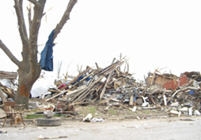Picking up the pieces
Human Ecology faculty lend their expertise in Greensburg
Five weeks after a 1.7-mile-wide killer tornado hit Greensburg, two programs from the College of Human Ecology remained on site, helping the rural community cope.
 Briana Nelson Goff and Charlie Griffin, leaders of the Kansas All-Hazards Behavioral Health program and the Kansas Rural Family Helpline respectively, praised the community's strength, volunteers' generosity and their co-workers' tenacity.
Briana Nelson Goff and Charlie Griffin, leaders of the Kansas All-Hazards Behavioral Health program and the Kansas Rural Family Helpline respectively, praised the community's strength, volunteers' generosity and their co-workers' tenacity.
Wearing bright green vests, the Kansas All-Hazards Behavioral Health team was on duty two days after the tornado destroyed 95 percent of the southwestern Kansas town.
Team members came from around the state, each a professional specially trained in the behavioral health needs of disaster survivors.
Goff called what they did "therapeutic presence."
They drove all-terrain vehicles through debris that used to be a town, handing out water, food and supplies.
They worked out of tents and makeshift shelters, easing chaos and helping survivors reconnect with each other and with possessions the tornado's 205-mph winds had flung around the countryside.
Goff recalled the stacks of photo albums in the trailer that served as city hall and the community's lost and found department. "There were picture albums everywhere," she said.
Goff estimated the team provided free outreach and crisis counseling to more than 13,000 tornado survivors the first two weeks.
The Greensburg area is the first response for the newly formed Kansas All-Hazards Behavioral Health Program. In 2005, Goff and Griffin were charged to develop a state plan for disaster behavior health in Kansas.
When the rare F5 tornado, the strongest designation, hit Greensburg on May 4, the Kansas Rural Family Helpline already was in place.
"We have been active in southwestern Kansas since the Dec. 31 blizzard," said Griffin, referring to the storm that killed livestock and left farms and ranches without power for as long as three weeks.
The tornado destroyed 961 homes in Greensburg. But lesser known, according to Griffin, is the damage to agricultural operations and rural homes in Kiowa, Pratt, Edwards and Stafford counties.
"This tornado has had a dramatic impact on the financial stability of many farms," he said.
The land was littered with piles of roofing, splintered wood and parts of tractors. Volunteers walked shoulder-to-shoulder, clearing fields so farmers could get back to farming.
"One woman called and told me, 'I don't even know what questions to ask,'" Griffin said.
Despite the sea of Federal Emergency Management Agency trailers, the exhaustive work of the U.S. Department of Agriculture and other organizations, Griffin was most impressed with the "good-ole-boy network."
"Farm people are doing what they always do," Griffin said. "They are helping each other."
Griffin said a Kansas Rural Family Helpline crisis counselor met with them that first week. "What do you need?" she asked.
"Ice," they said. They got ice. That quickly let them know "somebody was paying attention to their needs," Griffin said, summarizing the counselor's role.
Goff said some will face post-traumatic stress, perhaps for the rest of their lives. They don't have to face it alone, she said.
"We're in it for the long haul," Goff said of the two K-State programs.
"The quality and volume of helping is phenomenal and heartwarming in the face of tragic loss," Griffin said.
Photo: Tornado damage in Greensburg is documented in photos taken by Briana Nelson Goff, who leads the Kansas All-Hazards Behavioral Health program, and Charlie Griffin, who leads the Kansas Rural Family Helpline. Photo courtesy of Goff and Griffin.